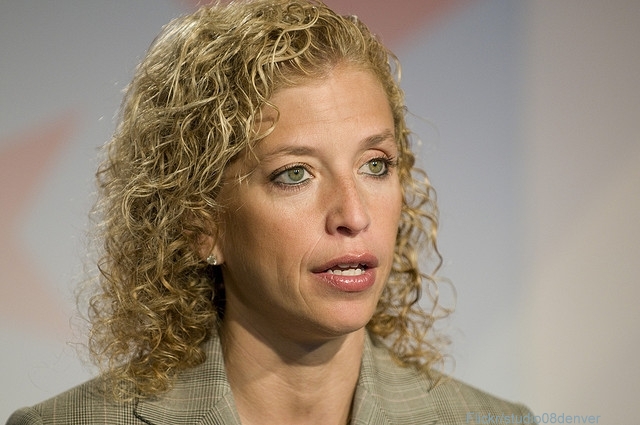Debbie does not do Havana.
Congresswoman Debbie Wasserman Schultz, chairwoman of the  Democratic National Committee, is not down with President Barack Obama‘s warming up to the Cuban government and told The Daily Signal last week — again, because she’s said it before — that the U.S. should perhaps wait to normalize relations as some kind of reward for democratic change on the island.
Democratic National Committee, is not down with President Barack Obama‘s warming up to the Cuban government and told The Daily Signal last week — again, because she’s said it before — that the U.S. should perhaps wait to normalize relations as some kind of reward for democratic change on the island.
What a concept!
“My view is different from President Obama’s,” Wasserman Schultz said, referring the the announcement last week that, after a 50 year absence, each country will re-open embassies in the other’s capital.
“I believe a relationship with the United States should be earned,” she said in the intrview. “Perhaps we should make sure that some of these human rights concessions are secured prior to moving forward.”
Hallelujah! She seems to know what the president and his cheerleaders — including all the big business and small business interests wanting to slice into Cuba — do not know, which is that totalitarian regimes that blatantly violate human rights, silences any dissidence and oppresses its people cannot be trusted with the honor system.
It’s not the first time Wasserman Schultz has made such comments, back in January she said the same thing about earning a relationship with the U.S. and was cautious about Obama’s rekindling of ties with the Cuban regime. But last week’s statements made Ladra wonder what other Dems in South Florida thought about cozying up to the Castro brothers. And they are not as reluctant:
Florida Sen. Dwight Bullard, chairman of the Miami-Dade Democratic Party, is all about dialogue:  “Negotiations or conversations with anyone I believe is always the path of least resistance. It’s high time the American government begins to have substantive conversations with Cuba as far as moving toward democracy. We have used diplomacy in other places as a means to an end. I think we can do that with Cuba as well.”
“Negotiations or conversations with anyone I believe is always the path of least resistance. It’s high time the American government begins to have substantive conversations with Cuba as far as moving toward democracy. We have used diplomacy in other places as a means to an end. I think we can do that with Cuba as well.”
Sen. Bill Nelson to reporters last week: “I still distrust Castro, but we have to get that regime to open up, stop human rights abuses, and give the Cuban people their basic freedoms. I think reopening the embassies is a necessary step in the long process toward achieving that goal.”
State Rep. Jose Javier Rodriguez, of Little Havana, is unhappy with the pace: “A lot of us feel like this was coming, but I am not one of the Democrats that is excited about the transition. It has to be tried because previous policies have not worked. My biggest concern is that the Obama administration policy of engagement is something that needs sustained attention from the administration. Maybe we’re getting it now, but at the speed with which this is happening… to me, the worry is that we’re not giving enough attention to the details of the negotiations,” Rodriguez said, adding that there are many questions about how to handle trade or banking or commerce with an economy that is still in the hands of the military. “My fear is it’s going too quickly. The way they are doing it is to sort of ‘get it done’ and not necessarily doing it right. Even though I think this is what we have to do, the pace of it is disturbing.” In the House, J-Rod filed his own memorial on the issue, opposing the opening of any Cuban government consulate or diplomatic office in Miami-Dade and urging the federal government to “limit engagement in diplomatic relations with the Cuban government to measures specifically designed to strengthen civil society in Cuba.”
tried because previous policies have not worked. My biggest concern is that the Obama administration policy of engagement is something that needs sustained attention from the administration. Maybe we’re getting it now, but at the speed with which this is happening… to me, the worry is that we’re not giving enough attention to the details of the negotiations,” Rodriguez said, adding that there are many questions about how to handle trade or banking or commerce with an economy that is still in the hands of the military. “My fear is it’s going too quickly. The way they are doing it is to sort of ‘get it done’ and not necessarily doing it right. Even though I think this is what we have to do, the pace of it is disturbing.” In the House, J-Rod filed his own memorial on the issue, opposing the opening of any Cuban government consulate or diplomatic office in Miami-Dade and urging the federal government to “limit engagement in diplomatic relations with the Cuban government to measures specifically designed to strengthen civil society in Cuba.”

Annette Taddeo, who is running against U.S. Rep. Carlos Curbelo in Congressional District 26, ran with former Gov. Charlie Crist for the top 2014 state ticket on a platform that included ending the embargo: “Our campaign was very clear. It was the first time we had people talking about the policy and how it hasn’t worked. I’ve always been steadfast in my position,” Taddeo said, and in the same breath followed immediately with how she’s come about face. “I’ll tell you when I changed my position on the embargo. I went to Washington D.c. with Yoani Sanchez,” Taddeo said, referring to the Cuban blogger. “I got her meetings with Harry Reid and Sen. [Bob] Menendez and Sen. [Marco] Rubio. It was important that everybody got to hear her point of view, as someone fighting from within. And hearing her and going through those halls with her, made that clear to me.” Furthermore, she hinted that it would be part of the 2016 congressional campaign. “I’m all for changes and support them and it’s a clear different position between me and my opponent, Curbelo. It’s a great test. For the first time we’ll have a congressional campaign in Miami with a difference of opinion on an issue that’s been politicized for so long.”
Congresswoman Frederica Wilson — who like Wasserman, enjoys a cordial relationship with the Miami-Dade Cuban Republican congress members — sort of took the cop out, saying in January that it was not her issue: “I defer all of that to my Cuban friends. That’s something that is personal to them. Just like I have my personal issues as an African-American. They have their personal issues and opinions. And I often leave that to them.” But she doesn’t necessarily agree with them, she said in the next follow up question. So she’s taking the easy way out by saying nothing.
Which is why, we suppose, it is so big that Wasserman Schultz should actually be on the record against one of her party’s apparent priorities and one of Obama’s legacy issues — porque esta sola, tan sola como the Cuban people.

